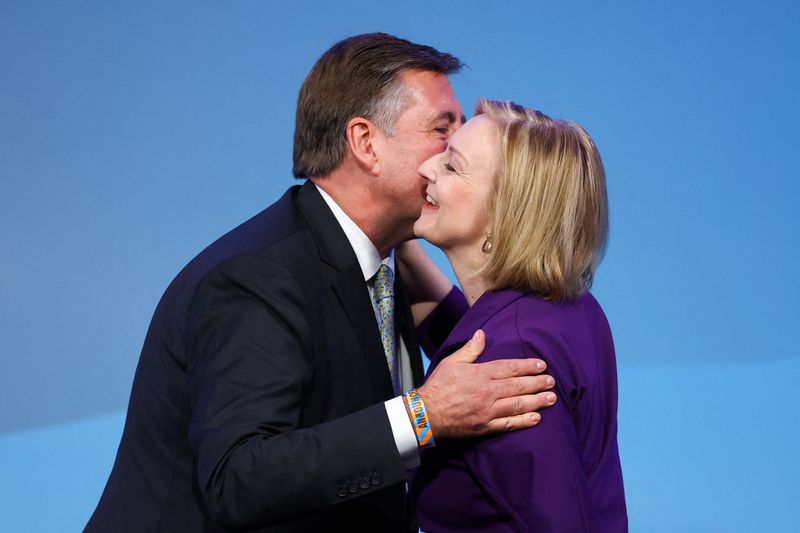By Elizabeth Piper and Andrew MacAskill
LONDON (Reuters) -Britain's Liz Truss comes to power on a promise to challenge the so-called "orthodoxy", demanding faster, radical action to tackle a cost of living crisis and shake the country out of what she says are years of sluggish growth.
The newly elected leader of the governing Conservative Party, who will be appointed prime minister on Tuesday, will inherit one of the toughest challenges of any new leader, and knows she cannot sit on her hands.
Britain faces runaway inflation, a long recession, the biggest hit to living standards in decades and the threat of strikes by millions of workers, while her party has shown it is prepared to bring down any leader who fails to deliver.
So far Truss has said she will challenge convention by cutting taxes and scrapping some planned rises despite warnings it will inflame inflation, while suggesting she will also immediately offer help to those struggling to pay energy bills.
That, plus a pledge to review the remit of the Bank of England, has cheered party supporters but rattled financial markets, prompting foreign investors to dump the pound and government bonds for fear of what is to come.
"I'm not somebody who takes no for an answer. I keep pushing and I keep pushing until I get things done," Truss told Conservative Party members during the campaign, referring to her role in drafting a bill that unilaterally changes trade rules agreed as part of Britain's departure from the European Union.
Addressing Conservative lawmakers and activists after she was announced the party's next leader and Britain's new prime minister, she said to applause: "We will deliver, we will deliver and we will deliver."
Those who have worked with her in the foreign office support her description, with two officials telling Reuters she has a laser-like focus on certain issues, tries to find creative solutions early on and then presses ahead, ignoring any doubts.
Truss will not be the first leader to try to take on what Conservative lawmakers call the orthodoxy - the establishment - or more disparagingly the "blob": public servants or advisers who are accused of a "stale groupthink".
Her approach to an early mini-budget may indicate how she intends to govern. While government normally works with the independent Office for Budget Responsibility (OBR) to set new fiscal rules, Truss planned a "fiscal event" without securing the watchdog's input on how it would affect public finances.
The OBR has since said it will have forecasts ready for September.
CONTINUITY JOHNSON?
In many ways, Truss is a continuation of Johnson, who she served under as foreign minister and who also sought to revolutionise the so-called machinery of government during his three turbulent years in power.
Johnson clashed with the Treasury over his "levelling up" plans to spend more to try to reduce regional inequalities, and Truss has singled out the powerful department for change, accusing it of being slow to take advantage of Brexit.
She regards the Treasury as too risk-averse and traces its stance back to Gordon Brown, the opposition Labour politician who was finance minister for a decade before becoming prime minister from 2007 until 2010. She also questions whether higher taxes mean more income, or whether handouts are effective.
Instead, Truss says she will rely on cutting taxes to spur economic growth, a strategy that economists and Rishi Sunak, the former finance minister whom she defeated in the party leadership contest, have warned will aggravate Britain's soaring inflation rate of 10.1%.
"Liz Truss has said that she will confront the Treasury orthodoxy that has generated feeble economic growth and is likely to fuel long-term stagflation of '70s proportions," Conservative former minister David Jones told Reuters.
"We need a heavyweight ... to take on the mandarins," he said, referring to her appointment of a finance minister.
Party sources say that could be Kwasi Kwarteng, business minister, though Jones and some other Conservative members of parliament would prefer John Redwood (NYSE:RWT), a veteran eurosceptic lawmaker who first entered parliament in 1987.
Whoever becomes chancellor will get a long to-do list from Truss, including moves to ditch corporation tax increases, plus regulatory and tax reform.
"This is not just about challenging the Treasury orthodoxy, but challenging the Whitehall orthodoxy to get things done," she said on the campaign trail, referring to an area in Westminster that is often used to describe the civil service.
Other sectors to face action include energy. She has pledged to push through fracking when communities agree, make more use of the reserves in the North Sea and deliver small modular nuclear reactors as well as nuclear power stations.
Though she campaigned for Britain to stay in the EU at the 2016 referendum, she is now a firm believer in Brexit and has pledged to deliver on its benefits.
Like Johnson, she has been a vocal supporter of Ukraine since Russia's invasion and has said she will increase defence spending to 3% by 2030. Kyiv is expected to be one of her first foreign visits.

Truss' to-do list will be costly, and several economists said it cannot be implemented without big cuts being made elsewhere. Sources close to her said some of those could land on the civil service, on a case-by-case basis.
"The new prime minister must realise ... if she comes for our hard-working members' jobs and working conditions, she'll face opposition every step of the way," said Mark Serwotka, general secretary of the PCS public service trade union.